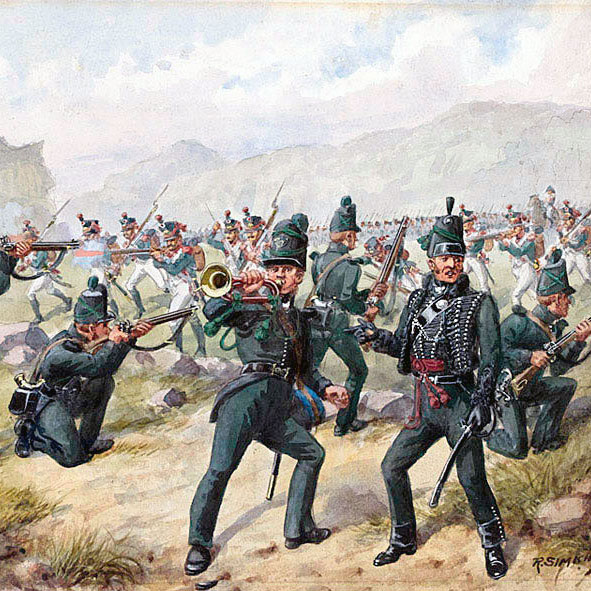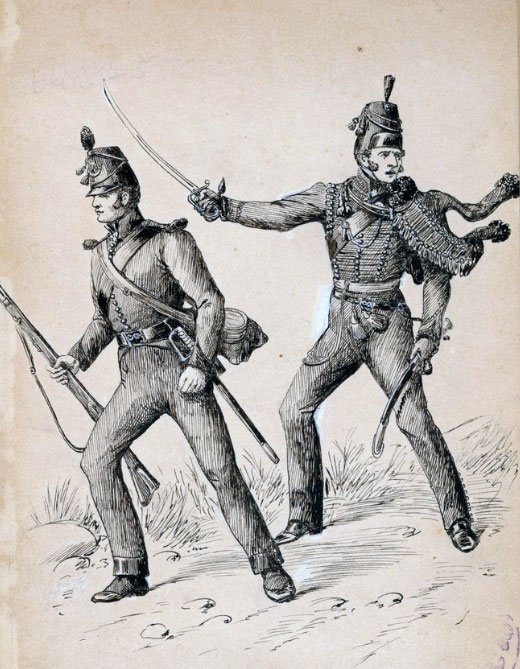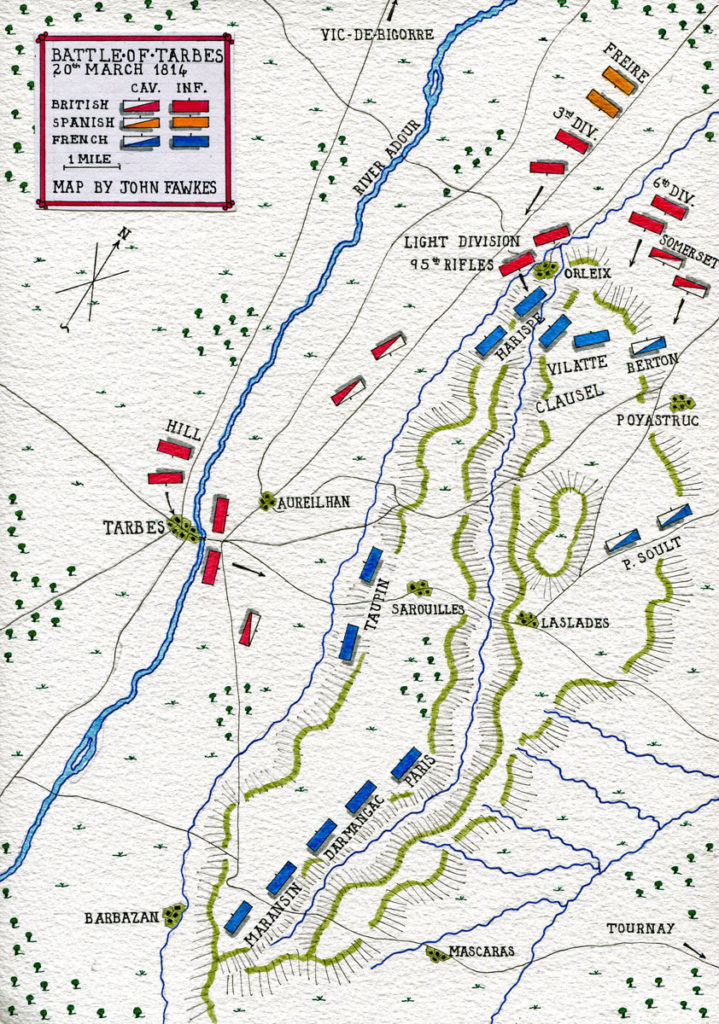The Action fought by Wellington against Marshal Soult on 20th March 1814 in Southern France, during the Peninsular War; where the three Battalions of the 95th Rifles distinguished themselves
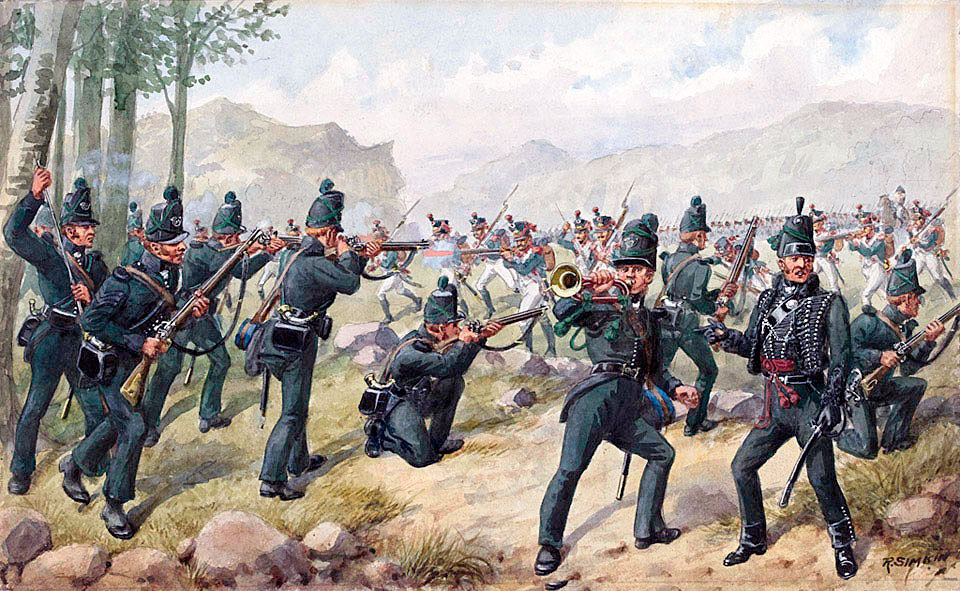
49. Podcast on the Battle of Tarbes: fought by Wellington against Marshal Soult on 20th March 1814 in Southern France during the Peninsular War; where the three Battalions of the 95th Rifles distinguished themselves: John Mackenzie’s britishbattles.com podcasts
The previous battle of the Peninsular War is the Battle of Orthez
The next battle in the British Battles Sequence is the Battle of Toulouse
War: Peninsular War
Date of the Battle of Tarbes: 20th March 1814
Place of the Battle of Tarbes: At Tarbes in South-Western France.
Combatants at the Battle of Tarbes: British, Portuguese and Spanish troops against the French.

Commanders at the Battle of Tarbes: Marquess of Wellington against the French commander, Marshal Soult.
Size of the armies at the Battle of Tarbes:
Soult’s French Army of the Peninsular comprised 25,000 infantry, 1,000 cavalry and 38 guns.
The force available to Wellington in the advance on Tarbes comprised 50,000 men.
Winner of the Battle of Tarbes:
In the face of Wellington’s advance, Marshal Soult withdrew through Tarbes and headed east for Toulouse, escaping for the time being from Wellington’s overwhelming strength.
Background to the Battle of Tarbes:
In early 1814, Marshal Soult, commanding the French ‘Army of the Pyrenees’, was under orders from the Emperor Napoleon to keep Wellington’s opposing army as near to the Pyrenees Mountains as possible, thereby preventing Wellington from joining the Austrian, Prussian and Russian armies confronting Napoleon in northern France.
In furtherance of these orders, Soult, following his defeat at the Battle of Orthez and his retreat to the northern bank of the River Luy de Béarn, on 29th February 1814, in the face of Wellington’s resumed advance, marched south-east to Aire and Barcelonne on the River Adour.
After some fighting during his withdrawal, Soult’s army lay at Maubourguet, 15 miles further to the south-east.
Wellington’s pursuit was severely hampered by the swollen rivers and streams fed by the heavy rain and the destruction of bridges by the retreating French troops.
By 8th March 1814, Soult’s headquarters and Harispe’s Division were at Tarbes. The other French divisions lay around towns further north; Villatte’s at Vic-de-Bigorre, Reille with Taupin’s and Maransin’s Divisions at Maubourguet and Clausel’s corps of Foy’s and Darmagnac’s Divisions at Plaisance, all in a north-south line, 20 miles in length.
On 12th March 1814, Beresford’s Corps occupied the city of Bordeaux, where the population declared for the displaced Bourbon Royalists.
General Hope invested Bayonne, besieging the French garrison.
Wellington began his move against Soult on 9th March 1814, his divisions advancing from Aire in an easterly direction, until they were 10 miles from Soult’s right flank at Plaisance.
On 12th March 1814, Soult’s divisions made a right wheel, as if advancing to attack Wellington, leading to skirmishes between the opposing outposts.
Soult’s boldness led Wellington to believe that he must have been reinforced by the 10,000 men of Suchet’s army from Aragon in Spain. This was not the case.
Wellington pulled his divisions back and concentrated them for battle around Aire, recalling his Fourth Division from Bordeaux.
Wellington now had under his direct command the Light Division, the Third Division, the Sixth Division, Hill’s Second Division and Freire’s Spanish Division.
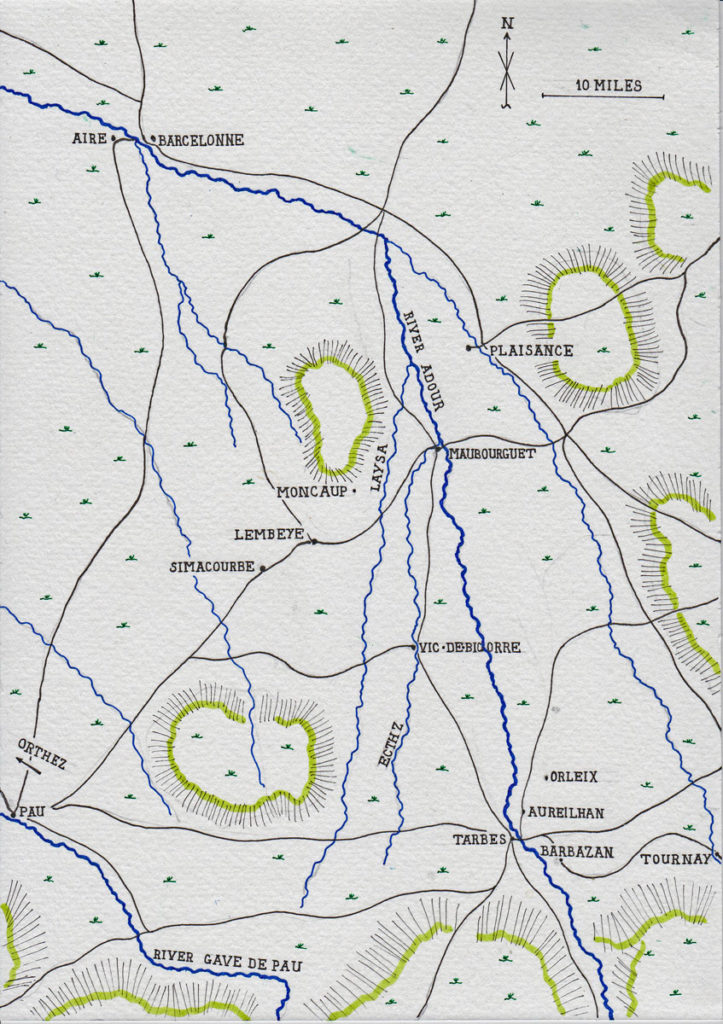
Between 13th and 17th March 1814, Soult pulled his army back.
Joined by the Fourth Division, Wellington, on 18th March 1814, followed up the French in three columns: Hill’s Corps on the right; Bock’s cavalry, the Third, Sixth and Freire’s Spanish Divisions in the centre; and Somerset’s Cavalry Division and the Fourth and Light Divisions on the left.
Ponsonby’s Cavalry Brigade marched between the left and centre columns.
Soult’s army, after wheeling to face the north, held positions between Simacourbe and Lembeye, from where the French skirmished with Hill’s advancing troops.
On the evening of 18th March 1814, Soult received news that Bock’s King’s German Legion Dragoons and sections of the British Third Division were in Moncaup, threatening his right flank.
Soult spent the night withdrawing in a south-easterly direction to the banks of the River Leysa.
On 19th March 1814, Wellington continued his advance south.
A skirmish between Bock’s KGL dragoons and Berton’s Cavalry Brigade near Maubourguet forced Berton away to the south-east and for the first time Soult realised it was the main body of Wellington’s army moving down the River Adour valley towards him.
In response, Soult ordered d’Erlon’s Corps of Darmagnac’s and Fririon’s divisions to Vic-de-Bigorre, in the path of Wellington’s advance and directed Clausel and Reille to march to Tarbes.
D’Erlon rode on ahead of his corps, with his staff, to reconnoitre. Arriving at the main road leading north from Vic-de-Bigorre at 11am, D’Erlon was stunned to see Bock’s Dragoon Brigade already advancing down the road.
D’Erlon ordered Fririon’s skirmishers to form along the side of the road with support from 4 guns.
Darmagnac’s Division deployed south of Vic-de-Bigorre, with its right flank on the River Adour.
D’Erlon maintained his position under attack by Picton’s Third Division, until around 3pm, when the Light Division came up on the bank of the River Adour.
D’Erlon withdrew Fririon’s Division, leaving Darmagnac to continue the action until nightfall, when it fell back.
At the end of 19th March 1814, 4 French divisions lay around Ibos, 3 miles to the west of Tarbes, while D’Erlon’s Corps held the main road between Tarbes and Vic-de-Bigorre.
Soult’s intention was to retreat to Toulouse, 100 miles to the north-east, by way of the road to Tournai, leading east out of Tarbes.
During the night Clausel’s and Reille’s corps moved through Tarbes to positions to the east of the town.
Battle of Tarbes on 20th March 1814:
On 20th March 1814, Soult’s divisions were assembled around Tarbes; Damargnac’s in the town, Fririon to the east, Reille’s corps of Maransin’s and Taupin’s Divisions to the south-east and a strong force of cavalry and infantry on the road north to Vic-de-Bigorre.
Clausel’s Corps lay around Orleix, on the right of the French line, with Berton’s Cavalry Brigade in support.
A battalion with a squadron and 2 guns occupied Aureilhan, a mile to the north-east of Tarbes.
Early in the morning of 20th March 1814, Darmagnac’s Division withdrew to Barbazan, 3 miles south-east of Tarbes, taking up a position on the left of Reille’s Corps.
Soult’s army was now drawn up facing west, on the left flank of Wellington’s troops advancing on Tarbes down the road from Vic-de-Bigorre.
Wellington’s troops were on each bank of the River Adour, Hill’s Corps heading for Tarbes, while the Light Division approached the hill to the south of Orleix and the Sixth Division marched to Pouyastruc, behind the French right.

At noon, the leading brigade of the Light Division, comprising the three battalions of the 95th Rifles, came into action against the French skirmish line in the valley below Orleix, driving the French back up the hill, where they re-joined their battalions.
Reaching the top of the slope, the British riflemen found themselves confronting the whole of Harispe’s Division, which they engaged, inflicting substantial casualties and forcing it back.
Clausel withdrew his corps from ridge to ridge, heading towards Tournay, to avoid being enveloped by the Sixth Division, coming up on his right.
On Wellington’s other flank, it took Hill until 2pm to clear Tarbes, by which time Soult was well on the road for Tournay.
The British cavalry were hampered in their pursuit of the retreating French by the close nature of the countryside.
The French reached Tournay by 10pm and the engagement came to an end.
Casualties in the Battle of Tarbes:
French casualties in the Battle of Tarbes are unknown but were probably around 1,000 killed, wounded and missing.
British casualties were 375 killed and wounded, of which around 250 were suffered by the Third Division in the fighting north of Vic-de-Bigorre and 90 by the 3 battalions of the 95th Rifles at Orleix.
Aftermath to the Battle of Tarbes:
Following the retreat out of Tarbes to the east, Soult marched hard for Toulouse on the River Garonne, sacrificing order and discipline for speed.
2 squadrons of the British 13th Light Dragoons surprised the French rear guard of the 10th Chasseurs à Cheval at St Gaudens, driving them through the town and inflicting 100 casualties on them.
The French reached Toulouse on 23rd March 1814, with many regiments in a state of near collapse.
Battle Honours and Medal for the Battle of Tarbes:
The Battle of Tarbes is a not a clasp on the 1847 Military General Service Medal nor a battle honour.
Anecdotes and traditions from the Battle of Tarbes:

- Napier describes in his history of the Peninsular War the actions of one of Wellington’s ADCs during the advance to Tarbes: ‘William Little , distinguished by the variety of his attainments, an artist, musician, mechanist, seaman, and soldier… rode forward as if he would force his way through the French skirmishers, but in the wood dropped his reins and leaned back as if badly wounded… he thus passed unobserved through the wood… and ascending to the open summit above galloped along the French main line, counting their regiments as he passed… and reaching the spot where Wellington stood told him there were but five battalions on the hill.’ William Little, a captain in the 92nd Highlanders, was killed at Quatre Bras.
- Sir John Kincaid, in his book ‘Adventures in the Rifle Brigade’, gave his recollection of the Battle of Tarbes as an officer of the 95th Rifles: ‘On the morning of the 19th, while we were marching along the road, near the town of Tarbes, we saw what appeared to be a small piquet of the enemy, on the top of a hill to our left, looking down upon us, when a company of our second battalion was immediately sent to dislodge them. The enemy, however, increased in number, in proportion to those sent against them, until not only the whole of the second, but our own (the first battalion) and the third battalion were eventually brought into action; and still we had more than double our number opposed to us; but we, nevertheless, drove them from the field with great slaughter, after a desperate struggle of a few minutes, in which we had eleven officers killed and wounded. As this fight was purely a rifle one, and took part within the sight of the whole army, I hope the reader will excuse my blushes while I give the following quotation from the author of “Twelve Year’s Military Adventure,” who was a spectator, and who, in allusion to this affair, says, “Our Rifles were immediately sent to dislodge the French from the hills on our left, and our battalion was ordered to support them. Nothing could exceed the manner in which the Ninety-fifth set about the business…. Certainly I never saw such skirmishers as the Ninety-fifth, now the Rifle Brigade. They could do the work much better and with infinitely less loss than any other of our best light troops. They possessed an individual boldness, a mutual understanding, and a quickness of eye, in taking advantage of the ground, which, taken all together, I never saw equaled. They were, in fact, as much superior to the French Voltigeurs as the latter were to our skirmishers in general. As our regiment was often employed in supporting them, I think I am fairly qualified to speak of their merits.’
References for the Battle of Tarbes:
See the extensive list of references given at the end of the Peninsular War Index.
49. Podcast on the Battle of Tarbes: fought by Wellington against Marshal Soult on 20th March 1814 in Southern France during the Peninsular War; where the three Battalions of the 95th Rifles distinguished themselves: John Mackenzie’s britishbattles.com podcasts
The previous battle of the Peninsular War is the Battle of Orthez
The next battle in the British Battles Sequence is the Battle of Toulouse
